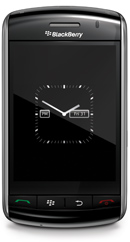I’m convinced that as hard as it might try, RIM is fighting a losing battle trying to compete against the iPhone. Why? Because RIM just doesn’t get how to compete against a company like Apple.  There is no doubt that RIM has a proven track record in the enterprise space. Push email and the ability to communicate wherever you are were revolutionary when they were first introduced.
There is no doubt that RIM has a proven track record in the enterprise space. Push email and the ability to communicate wherever you are were revolutionary when they were first introduced.
Unfortunately, RIM hasn’t done much since. They have lived on the reputation of being a secure device–which is extremely important–but they did little to attract a new audience. That left them vulnerable to a flanking attack by an innovative competitor and that’s just what happened when Apple entered the smartphone market.
Apple brought coolness and mass acceptance to the smartphone market. Previously, smartphones were considered the purview of the high-end business or enterprise market. Apple showed handset makers how that could be brought to the mainstream market.
And they did it like they do everything: Revolutionary tactics.
An Apple device had been rumored for years before it actually came out. That’s because Apple isn’t satisfied with just releasing another smartphone. They want to make a splash and completely change the way things are done.
Apple was knocked around for not having enterprise-level security and some people said it was nothing more than a toy, but the strategy worked. The iPhone took off.
Interestingly enough, RIM and many of the other companies ignored the iPhone when it was launched. I think Apple was glad to see that happen. That allowed them to work on the features that would make it truly compete with the BlackBerry.
 On March 6, 2008 Apple’s Phil Schiller dropped the bomb on RIM. The next version of the iPhone OS would feature push e-mail, calendar info and contact management; support for Virtual Private Networks (VPNs) including Cisco IPsec; and two-factor authentication, certificates and identities. The iPhone would also include the ability to deploy iPhones, set them up automatically and wipe them if necessary.
On March 6, 2008 Apple’s Phil Schiller dropped the bomb on RIM. The next version of the iPhone OS would feature push e-mail, calendar info and contact management; support for Virtual Private Networks (VPNs) including Cisco IPsec; and two-factor authentication, certificates and identities. The iPhone would also include the ability to deploy iPhones, set them up automatically and wipe them if necessary.
All of a sudden, RIM is squarely in Apple’s sights.
RIM should have seen this coming. It’s the way Apple works. Apparently it slipped right past them.
Typically, Apple releases an incredibly revolutionary product. It may not be full-featured yet, but it is so cool, it grabs the world’s attention. Next, people call it down because it doesn’t have this feature or that feature. Then Apple rolls in with an amazing update that fixes most of the complaints.
They’ve done it with Macs, iPods, software applications and now the iPhone. It’s a classic Apple maneuver.
Of course, as all of this work is going on fixing and enhancing the software, Apple engineers are already finishing up the next version of the hardware. When that drops into the lap of the public, it sells like wild fire.
Not everything you do can be revolutionary. Apple’s latest iPhones were evolutionary, but they’ve already reached the goal. The iPhone is the cool device to have, just like the iPod is the cool device to have. And it’s secure. And it’s powerful.
Don’t think that RIM hasn’t noticed either. All of a sudden they have the BlackBerry Storm and the Tour and anything else they can think of to try and break the grip that Apple is having on the market.
RIM’s last evolutionary product was 10 years ago. If you want to compete with a company like Apple, incremental products copying the features of the iPhone is not going to do it.
